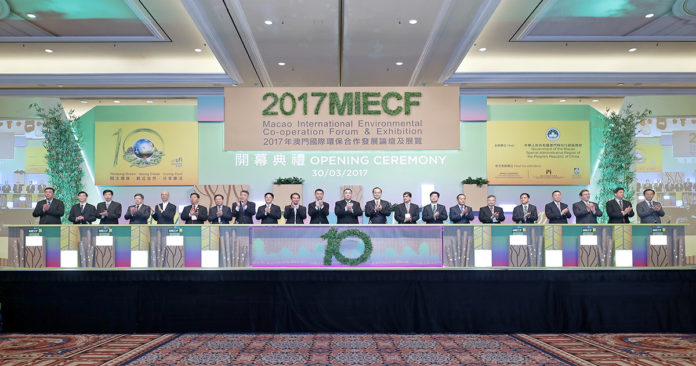Building up sustainable coastal tourism in the Pearl River Delta and the Greater Bay Area can be kick-started by the expansion of the yachting industry, points out Dr. Ieong Ho Tong, Chairman of the Macau Economic Development Promotion Association. The comments came at the opening day of this year’s Macao International Environmental Co-operation Forum & Exhibition (MIECF).
Dr. Ieong’s comments came in response to Business Daily enquiries about the outlying islands off the coast of Zhuhai, in particular Dong’ao Island, which houses a resort of international hospitality group Club Med.
Both Professor Ieong and the General Manager of the Club Med property in Dong-ao (as well as for the group’s Hong Kong and Macau operations) Sebastien Portes, commented on the possibilities of expansion for the MSAR’s tourism operations to include the neighbouring island, noting that both the private sector and the government will need to collaborate for a solution.
“The border control is a government operation,” points out Dr. Ieong additionally noting: “Customs and quarantine, also waterway controls and management,” noting that the collaborative aspect comes in on practical areas.
“The liners and ferries and the management of those, and facilitating business and maintenance – that could be managed by cooperation in the private sectors – and the increase in visitation and tourism is definitely a tendency in the future,” he notes.
In the initial stages, however, yachting could begin to pave the way.
“I think in Macau we could encourage at the preliminary stage the yachting leisure activities so as to be able to drive some of the facilitating business with yachting leisure activities,” notes Ieong, pointing out that the middle-income market could then be expanded.
Mr. Portes points out that for the group’s operations already it’s started taking steps to drive visitation.
“As a hotel operator we have a charter ferry. It’s a private investment but we can’t do anything without simplified immigration,” notes Portes, pointing that driving tourism to the “stunning location” also relies on “preserving this environment and participating in the improvement of the sustainable dimensions of the hotel and the whole island.”
Sustainability drives growth
This sustainability is something that is essential for the continued operations of the hospitality sector, points out Portes. “Even without any governmental constraints we have a very obvious challenge – we won’t have any more clients in five to 10 years time if we don’t comply to the standards, commit to protecting and developing our host regions,” states Portes, noting that once clients learn about a hospitality brand’s environmental, particularly millennials, they “are now choosing their destination taking into consideration the sustainability strategy and standards of the hotel they’re staying in”.
Andrew Jones, Chairman of the Pacific Asia Travel Association (PATA), notes that clients are, and will continue to be the driving force behind sustainable action, not only for individual clients.
“More and more we see that the corporations who are booking rooms and for the MICE (meetings, incentives, conventions and exhibitions) events are actually going to the hotels to the organizers and asking them what is their sustainability policy. These are things that are coming into the corporate world from the client point of view,” notes Jones.
“Nothing happens in isolation,” he opines, giving as example the fact that even guests eating in the resorts are concerned with the food chain, and plastics use.
Zhuhai
Developing cross-border solutions is key to the Greater Bay Area concept, suggests Dr. Ieong, even pointing out a possibility of creating a universal payment card, such as the Octopus Card mixed with Macau Pass – or contactless payment solutions such as Alipay, yet noting that building visibility could be a start at increasing length of stay.
“We can explore restaurants and bars and boutique shops along the coastal areas between Zhuhai and Macau. They could be developed into a comprehensive project and new projects can be done in such a way, especially in the evenings to cater to more tourists to spend the night in Macau and for those Mainland visitors if they cannot come to Macau at their convenience they can also enjoy more tourist activities on the Zhuhai bank,” notes Ieong.
This is backed up by research by PATA, points out Jones.
“Some of the research PATA has done is taking tourists from central locations and moving them to others nearby, working in cooperation to extend their experience – particularly with millennials – they’ll initially go to one place and then see what else is around,” points out the chairman.
However, everything needs to be done in moderation, notes the Chairman.
“It’s about master planning – although the private sector is about driving development and creating tourism opportunities and destinations, we also have to work with the government to make sure we have that in balance,” notes Jones.

























